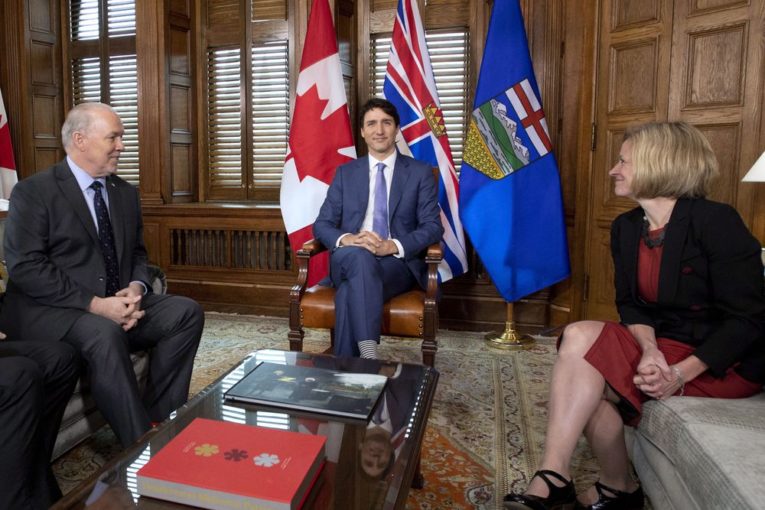
OTTAWA — Prime Minister Justin Trudeau says he has instructed his finance minister to enter negotiations with Kinder Morgan to “remove the uncertainty” hanging over the Trans Mountain pipeline expansion project.
Trudeau also says federal legislation is coming that will “reassert and reinforce” the fact that the federal government is well within its jurisdiction to approve the project and ensure it goes ahead.
He’s offering few details, however, saying the negotiations will not take place in public.
“Ideally, we wouldn’t be in this situation right now,” Trudeau told a news conference Sunday after a closely watched, last-minute meeting with B.C. Premier John Horgan, who is blocking Trans Mountain, and Alberta Premier Rachel Notley, who desperately wants to see it go ahead.
“Ideally, the rhetoric and actions by the B.C. government would not have led to the concerns of the company, that got approval to move forward on a project that is in the national interest,” he said.
“We are responding to this situation. We are demonstrating not just that we are exerting and understanding the responsibilities that come with the federal government, but demonstrating as well what we have long held — and what Canadians understand: that the environment and the economy must go together.”
Trudeau, whose political ambitions have a lot riding on the project, spent more than 30 minutes at the podium following Sunday’s meeting, much of it spent in an effort to depict Canada as a unified country with complex needs and interests, all in an effort to ease the persistent tensions in Western Canada and elsewhere over the dispute.
“B.C.ers and Albertans are not opponents; they are neighbours,” the prime minister said. “They are fellow countrymen and women who want the best for themselves and each other.”
Horgan was the first to emerge following the meeting, saying that nothing was discussed that would end his ongoing opposition to the project. Notley, meanwhile, said she’s confident the federal commitments will see the expansion go ahead.
Notley said her province and Ottawa had agreed on a plan to “eliminate” investor risk surrounding the Trans Mountain pipeline expansion project — a commitment she said ensures the pipeline “will be built,” although she refused to provide details.
“The federal government, along with the government of Alberta, has commenced discussions with Kinder Morgan to establish a financial relationship that will eliminate investor risk,” Notley said.
“I’m quite confident that should these discussions end successfully, that the pipeline will be built — and that is good, because the pipeline is in the national interest.”
Horgan also would not elaborate on the “legislative and financial measures” promised by Trudeau to push the project forward.
“Despite all of the commonality between the three of us, we continue to disagree on the question of moving diluted bitumen from Alberta to the port of Vancouver,” he said.
“We had a discussion about options; the federal government laid out their plans over the next number of days … and we had a discussion about what role British Columbia could continue to play to protecting and defending our coast.”
Horgan made clear that Trudeau made no threats and made it clear he had no intention of punishing B.C. residents.
Horgan’s opposition to Trans Mountain — rooted in part in the fact his tenuous NDP government depends on the support of the Green party, which staunchly opposes the project — is the main reason Kinder Morgan put the brakes on non-essential spending on the project a week ago.
Trudeau, meanwhile, has long insisted the Kinder Morgan pipeline is within federal jurisdiction and that Horgan’s government has no authority to block it — a claim Horgan wants the courts to evaluate, and one with which he says he plans to press ahead.
Horgan’s news conference was barely over before Conservative Leader Andrew Scheer was at the podium, laying the blame for the impasse squarely at the prime minister’s feet.
“His damaging policies … have only led to more uncertainty and instability in Canada’s resource sector,” Scheer said.
The energy sector, Scheer said, is now convinced that “Justin Trudeau does not want their business in Canada.”
Trudeau’s cabinet approved the pipeline in 2016, following an interim environmental review process that included assessing things such as the emissions that will be created from producing additional fossil fuels that will flow through it. The cabinet decided the project, which will build a new pipeline that runs parallel to an existing one but can carry twice as much, was in the national interest.
Trudeau has argued repeatedly his government has put in place the environmental protections and policies needed to reduce the risks of an oil spill, and that building the pipeline to get Canadian resources to market is necessary for the Canadian economy.
Notley has said Alberta could buy an equity stake in the pipeline, or even buy the whole thing if necessary.
Kinder Morgan, meanwhile, has given Trudeau until the end of May to find a solution that would provide their investors a measure of confidence that the project would be allowed to proceed.
The meeting, convened at the last minute Thursday as Trudeau was departing for the Summit of the Americas in Peru, marked the first time the three leaders have all been in the same room together to hash out the dispute.
You can read more of the news on source
